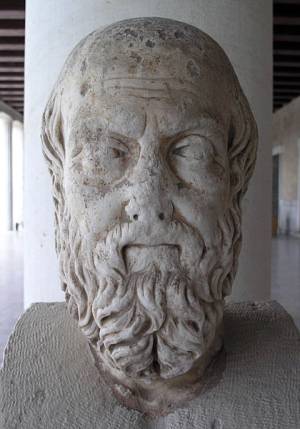Table of Contents
<html>
<a href=“http://lucianofsamosata.info/wiki/doku.php?id=submission_page”><img src=“http://lucianofsamosata.info/images/contact.png” /></a>
</html>
Herodotus Book 7: Artabanus' Speech
An Analysis
<html><p xmlns:dct=“http://purl.org/dc/terms/”><a rel=“license” href=“http://creativecommons.org/publicdomain/mark/1.0/”><img src=“http://i.creativecommons.org/p/mark/1.0/88x31.png” style=“border-style: none;” alt=“Public Domain Mark” /></a><br />This work (by <a href=“https://lucianofsamosata.info/wiki” rel=“dct:creator”>https://lucianofsamosata.info/wiki</a>), identified by <a href=“http://meninpublishing.org” rel=“dct:publisher”><span property=“dct:title”>Frank Redmond</span></a>, is free of known copyright restrictions.</p></html>
Authored by Frank Redmond, 2006
In his Histories, Herodotus uses Artabanus’ speech as the perfect platform from which to articulate his ideas on men’s affairs, especially in regards to war and peace. Artabanus’ speech follows a general principle that men must know when they have overextended themselves and when it is in their best interest to stop.
Artabanus’ speech goes against the presumed wisdom that both Xerxes and Mardonius uphold, a wisdom which basically states that war is the only solution to the “Greek problem” and that Persia deserves to possess the whole world due to its universal superiority. Artabanus knows that these prejudices are going to cause a great deal of trouble if the Persians choose to confront the Greeks and he must dissuade Xerxes and Mardonius appropriately. Artabanus says that they should keep the failed Scythian campaign in mind before making their decision and says, contrary to the supposed wisdom of both men, that “[the Greeks] have a reputation of being very brave, both on sea and land; there is danger in all this” (7.10). Artabanus reminds the Persians that the Athenians alone have previously destroyed a Persian contingent at Marathon in a battle which the Persians, who greatly outnumbered the Greeks, should have won. (He seems to be suggesting that the whole Greek world can do much more damage to the Persians). He also reminds the Persian assembly that even if they cross the Hellespont, there is no guarantee that they will be able to return safely to Persia. It would be easy for the enemy to destroy the bridge, thus leaving the Persians in a precarious position in Europe. In fact this almost happened before when the Persians fought the Scythians. If it wasn't for Histiaeus and his pro-Persian sympathies, the empire would have been crushed. As such, it is a bad idea for a whole empire to hinge upon one man. Artabanus' diatribe so far has been in response to the prejudice that the Greeks are a weak and ignorant people; Artabanus wants Xerxes to take them seriously.
Next, Artabanus goes on to address the issue of Persian superiority and might. He makes the point that things that have grandeur tend to become targets of divine (or authoritative) wrath. The might of Persia might be compared to a great tree or large house which gets struck by lightning while smaller things escape. Artabanus explains how a great army like Persia's might be destroyed because of its size and power, “for once the god has conceived jealousy against a great army, he may hurl fear upon it or his thunder, and it will perish in a way unworthy of itself” (7.10). So Artabanus completely disagrees with the assessment of the Greeks by Xerxes and Mardonius. He has a sinking-feeling that the Greeks, although they may be small, might become a thorn in the side of the Persians, or worse might defeat and destroy Persian dominion. Artabanus also has some general wisdom for the Persian assembly. He states that expediency begets failure as there is much good to be found in hesitation.
Artabanus wants nothing more than for Xerxes to heed his words, but this does not come to pass as is evidenced by Xerxes reply, “you are a coward and spiritless” (7.11). His mind will change however.
Herodotus adequately foreshadows what is going to occur in the future through Artabanus’ speech. He shows that wisdom can prevail over might and that wisdom is the key to accurately assessing the future. Just like Herodotus’ previous discussions concerning wisdom, the speech of Artabanus holds true not just for a particular time, but for all time.
